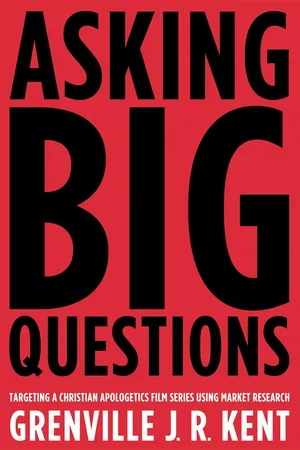![]()
1
Introduction
What do Australians think about God, and why? What factors—logical, emotional, experiential, intuitive—incline them toward belief and what toward unbelief? How do they weigh these factors, and balance them if they compete? Why do many seem to be “swing voters” in the unsure middle on this question, sitting comfortably on the fence, unmotivated to move far either way? In what areas do they share common ground with Christianity? What are their objections to Christian belief and practice, and their misunderstandings of Christianity? What apologetical approaches would make most sense to them? What media products do they enjoy and trust? And how should these insights influence apologetics—specifically, an apologetics-based film series?
These are questions that have fascinated me in the twenty-seven years since I became a Christian (thanks largely to apologetic outreach or thoughtful “persuasive evangelism”). When making outreach presentations to live audiences, I often ask them to list reasons why people do or do not believe in God, noting these on a whiteboard and discussing each in turn. I must have done this hundreds of times over the years, which served as some kind of market research.
These questions are also directly relevant to my current ministry focus as a writer-producer of an outreach film series called Big Questions. It aims to do unapologetic apologetics—and yes, I would like a less ambiguous title: Christian evidences? Persuasive evangelism? These thirteen films will make the case for the veracity and usefulness of Christianity and the Bible. Specifically, this project forms a polite response to the well-publicized and influential New Atheism of Richard Dawkins, Daniel Dennett, Christopher Hitchens, Sam Harris, Michel Onfray, and the like, and takes up many of their arguments.
The brief positioning statement (or “elevator pitch”) of Big Questions is:
Big Questions: A Brief History
Filmmaker Marcus Gillezeau describes a cyclical model of film production, beginning with concept (generating creative ideas), then development (refining the idea, selecting key personnel), financing, pre-production (planning the shoot), production, post-production (editing and music), marketing, distribution and, as a result of all this, generating fresh concepts and beginning the process again. This research project began at the end of the concept stage and overlapped development. I am not coming to it tabula rasa, because research rarely works like that, and nor do I expect audiences to tell me my message or product: who could have market researched the idea of the Internet in 1985? Yet I regard this research as part of the creative development process, sensing the value of testing ideas and hypotheses on real people in a formal way with feedback and peer review, as an attempt to be more objective rather than “precious” about my ideas. This research was performed while I still had time to re-script, or indeed to replace entire episodes if the research suggested the topic is inappropriate for some reason. Previous to the project reported in this thesis, there were also surveys of young Christians in tertiary education (sample size c. 400) and of Christian ministers (sample size c. 90), which were coordinated by Graeme Christian, one of the Executive Producers of Big Questions, but which are not fully reported here.
I have been dreaming for about fifteen years of doing a project like this. In 2008 I took long service leave and went on a Billy Graham-style mission team to Russia, where I had some free time to think and pray. I reread the book of Acts, and saw particular relevance in Acts 17, as I will explain in the next chapter. I wrote feverishly: concepts, approaches, initial drafts for scripts, a basic marketing plan. This was my concept stage. I then came home and pitched the Big Questions concept to Christian philanthropists and to senior church executives. The essence of the pitch was to draw a three-tiered pyramid on the lunch napkin or whiteboard, asking them to imagine their faith as a pyramid. The base level was to do with the question “Is there a God?,” and the blocks were classic arguments for and against theism. The second level up said, “Which God?,” and here were arguments for Jesus and the Bible (though not arguments against other religions). The highest level was called “How do I relate to God?,” and considered devotional questions and denominational distinctives. I then asked three questions. First, at which level were most Australians a generation or two ago? They would say, “Level three.” Second, at which level are most young, educated Australians today? They would answer, “Level one.” Third, I would ask where their church currently spends most of its energy and money and media resources. They would answer immediately, “Level three!” and their faces would show that they had seen the problem clearly.
We received development funding for a first script and th...
